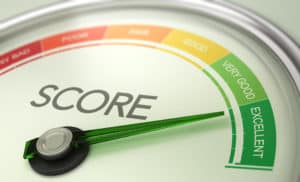A credit score is a number that potential lenders will use to determine whether they should lend you money, how much, and at what interest rate.
Your credit score, also called a FICO score, is an actual number, between 300 and 850. The higher the number, the better: a score of 740 to 799 is considered very good, though the average is closer to 700. FICO is an acronym for Fair Isaac & Co., the company that is responsible for tabulating your credit score.
Each of the three main credit agencies – Experian, Equifax, and TransUnion – have a score for you based on your credit report at that individual agency. Each agency has more than 200 million files on people who have a credit history because they have used credit, and 4.5 billion are updated in those files every month. The agencies tend to have different information on the people they track. This means your credit report and score will vary from agency to agency.
Those scores are what potential creditors, landlords, employers and insurers look at for an instant judgement on your creditworthiness.
That’s important because lenders believe that people who are creditworthy will pay back what they owe. That’s why better credit reports and higher credit scores make it easier, and cheaper, to borrow money. It also makes it easier to rent an apartment, buy a house, get insurance, and a number of other day-to-day essentials.
Sources of Data
Credit scores are the result of a compilation of several different sources of data that are available in your credit report. That data falls into four distinct categories, which are listed in order of how much weight they usually have in informing your score:
- Payment history
- Amounts owed
- Length of credit history
- Types of credit used
You’ve heard before that paying credit card bills on time is crucial, and the list above is why. Your payment history is the single most important factor in determining your credit score. This history includes if you pay on time, if you pay in full or only the minimum balance, and if you have late or missed payments.
Avoiding a Bad Score
There are two ways to have a bad credit score. The first, not surprisingly, is by not using credit wisely. That means spending more than you can afford, not paying your bills on time, and having too much outstanding credit, often spread across multiple credit card accounts.
The second is not as intuitive but is still a factor. You can have a poor credit score if you don’t use credit at all. In order to determine your score, there needs to be some kind of history to base it on. So simply cutting up your credit cards, or never having a credit card account, isn’t the path to a high credit score.
What Doesn’t Count
One important thing to know about credit scores is that the information is limited to how you use credit. There is no information about your race, religion, medical history, or lifestyle. There’s not even any data on your checking and savings accounts or your investment accounts. It’s all about how you use credit.
Monitor Your Score
Staying on top of your credit score can help you build and maintain a good score. It can also alert you to any suspicious or fraudulent activity, such as someone stealing your identity and using your credit to falsely apply for loans. There are free resources to review your credit score and report annually, such as www.annualcreditreport.com.
Main Street Bank offers a free credit score service for customers, available within the consumer mobile banking app. Learn more about our Credit Score service.
Repairing Your Credit Score
If you are unsure of where to begin to repair a less-than-ideal credit score, get ideas for what you can do in the short- and long-term. To begin, select “Get Started” below, and follow the prompts.


